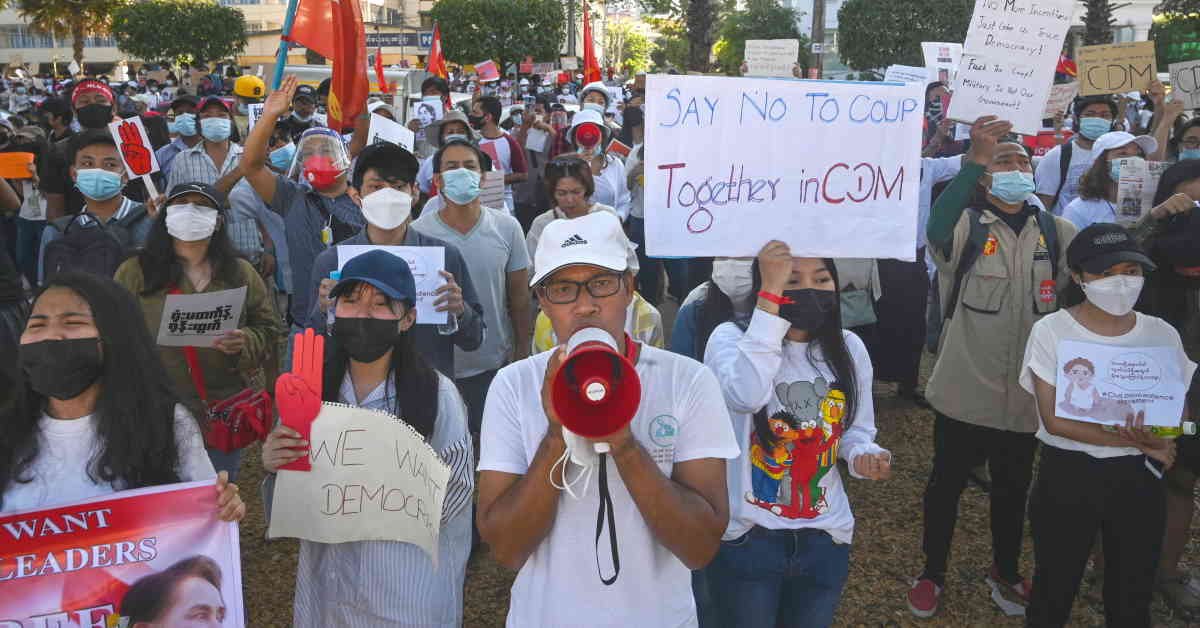The United States (US) on Thursday slapped sanctions on the leaders of Myanmar's junta, warning that more punishment could come even as the generals in Yangon ordered demonstrators to get back to work or face "effective actions".
As Myanmar was preparing for a seventh consecutive day of anti-coup rallies, the US Treasury Department announced it was blocking any US assets and transactions with 10 current or former military officials held responsible for the 1 February coup.
Demonstrations condemning the ouster of civilian leader Aung San Suu Kyi have largely been peaceful, although security forces earlier in the week used tear gas, water cannon and rubber bullets on protesters, with isolated reports of live rounds being fired.
In the most significant concrete action, President Joe Biden announced his administration was cutting off the generals' access to US$1 billion in funds in the US.
Targets of US sanctions announced Thursday include Army chief General Min Aung Hlaing, who now holds legislative, judicial and executive powers in Myanmar. Hlaing was already under US sanctions over the campaign against the mostly Muslim Rohingya minority.
Also targeted are military leaders in the new cabinet such as Defence Minister General Mya Tun Oo, as well as three gem exporting companies controlled by Myanmar's military.
"We are also prepared to take additional action should Burma's military not change course," Treasury Secretary Janet Yellen said, using Myanmar's former name.
"If there is more violence against peaceful protesters, the Burmese military will find that today's sanctions are just the first," she said.
Biden had earlier called on Myanmar's military to release democratic political leaders and activists, adding "the military must relinquish power."
In Europe, former colonial power Britain welcomed Biden's steps, with foreign secretary Dominic Raab tweeting that "we will hold those responsible to account".
European Union foreign policy chief Josep Borrell also warned that the bloc could impose fresh sanctions on Myanmar's military.
Back To Work ... Or Else
General Hlaing late Thursday called for civil servants to return to work after days of nationwide strikes supporting the protests.
"Due to unscrupulous persons' incitement, some civil service personnel have failed to perform their duties," he said in a statement.
"Effective actions will be taken."
Since the coup there has been an outpouring of anger and defiance, calling for the release of Suu Kyi and other detained senior figures of her National League for Democracy (NLD) party.
Demonstrators marched peacefully on Thursday in Naypyidaw - the capital and military stronghold - as well as Yangon, the largest city and commercial hub, which saw tens of thousands flood into the streets.
"Don't go to the office," chanted protesters outside Myanmar's central bank in Yangon, part of the effort urging people to boycott work to pressure the junta.
"We aren't doing this for a week or a month - we are determined to do this until the end when (Suu Kyi) and President U Win Myint are released," a protesting bank employee said.
Joining the protest were dozens from the ethnic Karen, Rakhine and Kachin communities - drawn from Myanmar's roughly 130 ethnic groups, some of whom have faced intense persecution from the army.
"Our ethnic armed groups and ethnic people have to join together to fight against the military dictatorship," Saw Z Net, an ethnic Karen protester said.
In Shan state, demonstrators in traditional costumes took their anti-coup message to the water on Lake Inle, with similar scenes unfolding in the ancient UNESCO heritage city of Bagan as hundreds marched between temples and pagodas.
Crackdown Deepens
There were more reports of arrests on Thursday, including the deputy speaker of the parliament's lower house and a key aide to Suu Kyi.
The number of coup-linked detentions is now more than 200, according to monitor Assistance Association for Political Prisoners.
The NLD - whose Yangon headquarters saw a raid this week - also confirmed the arrest of election officials in the afternoon.
The military justified the power grab by claiming widespread voter fraud in November's polls, which saw a landslide for Suu Kyi's party.
It quickly moved to stack courts and political offices with loyalists as it ended a decade of civilian rule.
It was unclear how long the junta will tolerate the protests.
Live rounds were fired at a rally in Naypyidaw this week, critically wounding two people - including a woman who was shot in the head.
Images depicting the woman have been shared widely online alongside expressions of grief and fury.
The military's clampdown on information using internet blackouts - with tech companies ordered to cut communications intermittently - has drawn widespread condemnation.
Concern grew that the junta was planning to impose a much harsher internet crackdown, including enacting measures that would allow the military to order blackouts and website bans. - AFP
